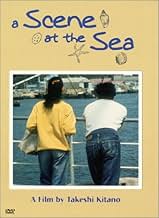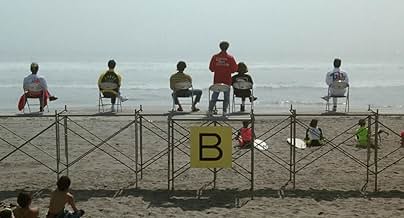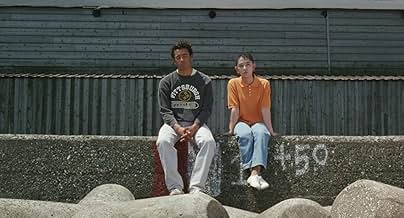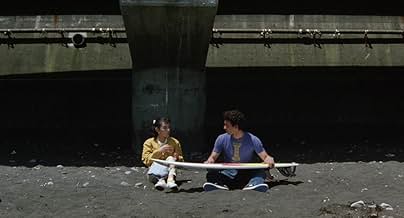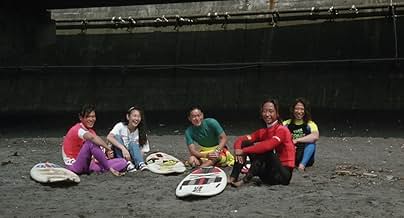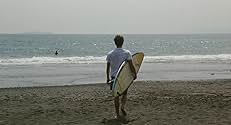Ano natsu, ichiban shizukana umi
- 1991
- 1h 41min
CALIFICACIÓN DE IMDb
7.5/10
7.1 k
TU CALIFICACIÓN
La vida de una pareja joven, con discapacidad auditiva y deprimente se anima después de que el chico se interese por el surf.La vida de una pareja joven, con discapacidad auditiva y deprimente se anima después de que el chico se interese por el surf.La vida de una pareja joven, con discapacidad auditiva y deprimente se anima después de que el chico se interese por el surf.
- Dirección
- Guionista
- Elenco
- Premios
- 11 premios ganados y 6 nominaciones en total
- Dirección
- Guionista
- Todo el elenco y el equipo
- Producción, taquilla y más en IMDbPro
Opiniones destacadas
I watched a scene at the sea last night, I was feeling really tired but it actually helped to watch the film in a drowsy state, it is a really simple story and the way kitano tells the story is even more simple, I just can't get over kitano, he's a really incredible film aker, I've only scene this and "hanabi" and "brother", but they all deict a similarly strange world. I like the fact that the camera barely ever moves instead relying on really beautiful long shots that look, in a lot of cases, like paintings. I'm going to make it my mission to see all 11(?) of the films he has directed. Kitano really is just one of those people who can make you forget your watching a movie, the way it all unfolds just feels like something else The acting was reserved but completely convincing, especially between the two main characters, the fact that you could get such a strong sense of character from two people who never speak is really amazing. My appreciation for kitano grows with every film I watch, seek these films out, they're worth it.
10kmevy
Really impressive! It might alienate those, who want constant action and dialog's but for those who like Kitano movies in general will also love this movie.
In each Kitano movie you can feel this quiet and meditative atmosphere; like in Dolls and Hanabi for example.
But i have to say that i am again quite astonished how different Kitano appears in television, as a comedy-punk, in contrast to his own directed and very contemplative movies.
Some adjectives might be able to describe my impression of this movie: quiet, meditative, sad .. and beautiful
In each Kitano movie you can feel this quiet and meditative atmosphere; like in Dolls and Hanabi for example.
But i have to say that i am again quite astonished how different Kitano appears in television, as a comedy-punk, in contrast to his own directed and very contemplative movies.
Some adjectives might be able to describe my impression of this movie: quiet, meditative, sad .. and beautiful
Ano Natsu Ichiban Shizukana Umi/A Scene at the Sea(1992) is about a young male deaf-mute who after picking up an old surfboard has ambitions of becoming a champion surfer. Ambition becomes an important theme in this simple and tender romantic comedy. Shigeru unlike Masaki of 3-4x Jugatsu/Boiling Point(1990) wants to do something with his life and has ambitions for something successful. Ambition of a major character in a Takeshi Kitano film plays an essential role in Kids Return(1996).
Moves away from the Yakuza world of Violent Cop(1989) and Boiling Point(1990). Takeshi Kitano is no different from some directors like John Woo or Sam Peckinpah in following up an intense violent film with a charming simple film. Evident that Takeshi Kitano is a versatile filmmaker who's not a one trick pony. A Scene at the Sea(1992) returns to the director's roots as a famed comedian of Japanese television.
Driven not by the surfing portion of the story but by the silent and expressionistic love between Shigeru and another deaf-mute person named Takako(woman). Their love for each other reaches a metaphysical level where words would do little justice in expressing the feelings of love. The expressionistic relationship between Shigeru and Takako resembles the almost silent but touching relationship of Nishi and his wife in Hana-Bi/Fireworks(1997). The feelings of love between Shigeru and Takako seems simple on the surface but is much more confound and complex once the viewer goes deep into the core of the apple.
A Scene at the Scene is a wonderful film because it devoids of the usual cliches that typify the American beach and surf movie. Takeshi Kitano reinvents the American Surf film into something more Japanese and profound. Has none of the annoying aspects that characterize the American surf film. Overlooked as a film by one track minded critics and even mainstream audiences because of its take your time pace and subject.
If it weren't for most of the characters being able to talk then A Scene at the Sea(1992) would be a silent film. The first line of dialogue does not come into play until five minutes into A Scene at the Sea(1992). The Closet Takeshi Kitano has come to making a silent picture(Combines the aspects of the silent and sound pictures). I would enjoy seeing Takeshi Kitano take on a project like a silent film because he could finds ways of reinventing this old style of filmmaking.
Except for one moment there isn't any violence in sight which is unusual for a Kitano feature film. The one violent scene is only brief and is about a minute at best. The only other completely non violent feature Takeshi Kitano has done besides A Scene at the Sea(1992) is the sex comedy, Getting Any(1994). Interested in the peaceful aspects of human behavior instead of its violent counterparts.
Volume three of the Beat Takeshi series and the first without Takeshi Kitano as an actor. Not acting here gives Takeshi Kitano more focus on the directing and editing chores. His acting style is filtered through the acting performances of Kuroudo Maki and Hiroko Oshima. A mature direction with focus on the simplicities of movie making.
A Scene at the Sea(1992) uses the favorite Kitano locations of the beach and the sea more regularly than in any other film by him except Sonatine(1993) and Fireworks(1997). The bulk of the story takes place in beaches or near the sea. The only other filmmaker I can think of who used the beach and the sea as part of his landscapes is Italian filmmaker, Mario Bava. Shigeru is someone who's at home at the beach and feels a sense of personal happiness when working hard to become the best surfer he can be.
The ending was very perplexing when I first saw this movie because of the merger of the past and present. The final two scenes have an air of Alain Resnair with the non linear use of flashback and present imagery. Feels like a moment out of a Alain Resnair film because things cease to make sense and becomes a series of lyrical images. Ano Natsu Ichiban Shizukana Umi/A Scene at the Sea(1992) was the first director-film composer collaboration between Takeshi Kitano and Jo Hisaishi.
Some of the acting method resembles the Antonin Artaud style of acting which is characterized by bodily expressions being more important than words. The silent performances of Kuroudo Miki and Hiroko Oshima are examples in the Artaud idea of metaphysical acting. Like in his work for the theater, two of the characters in A Scene at the Sea(1992) are mute(the plays of Artaud always included someone who doesn't speak with words literally but with visual expression). What gives the acting of the two main characters an Artaud flavor is the reliance of the expression of the senses(Imagery) over the expressions of the mind(words).
Moves away from the Yakuza world of Violent Cop(1989) and Boiling Point(1990). Takeshi Kitano is no different from some directors like John Woo or Sam Peckinpah in following up an intense violent film with a charming simple film. Evident that Takeshi Kitano is a versatile filmmaker who's not a one trick pony. A Scene at the Sea(1992) returns to the director's roots as a famed comedian of Japanese television.
Driven not by the surfing portion of the story but by the silent and expressionistic love between Shigeru and another deaf-mute person named Takako(woman). Their love for each other reaches a metaphysical level where words would do little justice in expressing the feelings of love. The expressionistic relationship between Shigeru and Takako resembles the almost silent but touching relationship of Nishi and his wife in Hana-Bi/Fireworks(1997). The feelings of love between Shigeru and Takako seems simple on the surface but is much more confound and complex once the viewer goes deep into the core of the apple.
A Scene at the Scene is a wonderful film because it devoids of the usual cliches that typify the American beach and surf movie. Takeshi Kitano reinvents the American Surf film into something more Japanese and profound. Has none of the annoying aspects that characterize the American surf film. Overlooked as a film by one track minded critics and even mainstream audiences because of its take your time pace and subject.
If it weren't for most of the characters being able to talk then A Scene at the Sea(1992) would be a silent film. The first line of dialogue does not come into play until five minutes into A Scene at the Sea(1992). The Closet Takeshi Kitano has come to making a silent picture(Combines the aspects of the silent and sound pictures). I would enjoy seeing Takeshi Kitano take on a project like a silent film because he could finds ways of reinventing this old style of filmmaking.
Except for one moment there isn't any violence in sight which is unusual for a Kitano feature film. The one violent scene is only brief and is about a minute at best. The only other completely non violent feature Takeshi Kitano has done besides A Scene at the Sea(1992) is the sex comedy, Getting Any(1994). Interested in the peaceful aspects of human behavior instead of its violent counterparts.
Volume three of the Beat Takeshi series and the first without Takeshi Kitano as an actor. Not acting here gives Takeshi Kitano more focus on the directing and editing chores. His acting style is filtered through the acting performances of Kuroudo Maki and Hiroko Oshima. A mature direction with focus on the simplicities of movie making.
A Scene at the Sea(1992) uses the favorite Kitano locations of the beach and the sea more regularly than in any other film by him except Sonatine(1993) and Fireworks(1997). The bulk of the story takes place in beaches or near the sea. The only other filmmaker I can think of who used the beach and the sea as part of his landscapes is Italian filmmaker, Mario Bava. Shigeru is someone who's at home at the beach and feels a sense of personal happiness when working hard to become the best surfer he can be.
The ending was very perplexing when I first saw this movie because of the merger of the past and present. The final two scenes have an air of Alain Resnair with the non linear use of flashback and present imagery. Feels like a moment out of a Alain Resnair film because things cease to make sense and becomes a series of lyrical images. Ano Natsu Ichiban Shizukana Umi/A Scene at the Sea(1992) was the first director-film composer collaboration between Takeshi Kitano and Jo Hisaishi.
Some of the acting method resembles the Antonin Artaud style of acting which is characterized by bodily expressions being more important than words. The silent performances of Kuroudo Miki and Hiroko Oshima are examples in the Artaud idea of metaphysical acting. Like in his work for the theater, two of the characters in A Scene at the Sea(1992) are mute(the plays of Artaud always included someone who doesn't speak with words literally but with visual expression). What gives the acting of the two main characters an Artaud flavor is the reliance of the expression of the senses(Imagery) over the expressions of the mind(words).
Deaf and introvert Shigeru works as a garbage man while his mind is at surfing. He has a very patient girlfriend by his side with which he communicates very little.
Compared to another surf movie say 'Point Break' there are no other similarities than the surf boards. In 'Ano Natsu ...' there is no action, nothing spectacular and no glorification; its a slice of life movie with its humour in the details. The pace is slow, at first it seemed boring, but you'll grow into it quickly and find it rewarding.
The 80s love scene style music by Joe Hisaishi was surprisingly tolerable, its understated anyway.
My favourite Kitano film so far together with 'Dolls'.
Compared to another surf movie say 'Point Break' there are no other similarities than the surf boards. In 'Ano Natsu ...' there is no action, nothing spectacular and no glorification; its a slice of life movie with its humour in the details. The pace is slow, at first it seemed boring, but you'll grow into it quickly and find it rewarding.
The 80s love scene style music by Joe Hisaishi was surprisingly tolerable, its understated anyway.
My favourite Kitano film so far together with 'Dolls'.
This movie, directed by Takeshi Kitano, moves at a measured pace, one that allows the viewers to feel and relate to the situations slowly. On one level, it talks about a mute garbage collector's desire to become a surfer, yet it also deals with unspoken love, silence, and determination. One of the gentlest, most subtle movies I have seen. A simple expression, at times, is worth more than complex ones. Takeshi Kitano understands this.
¿Sabías que…?
- TriviaThe first film by Takeshi Kitano that doesn't feature any violence.
- ConexionesReferenced in Sup chuk sui dik ha tin (2005)
Selecciones populares
Inicia sesión para calificar y agrega a la lista de videos para obtener recomendaciones personalizadas
- How long is A Scene at the Sea?Con tecnología de Alexa
Detalles
- Tiempo de ejecución1 hora 41 minutos
- Color
- Mezcla de sonido
- Relación de aspecto
- 1.85 : 1
Contribuir a esta página
Sugiere una edición o agrega el contenido que falta

Principales brechas de datos
By what name was Ano natsu, ichiban shizukana umi (1991) officially released in India in English?
Responda
